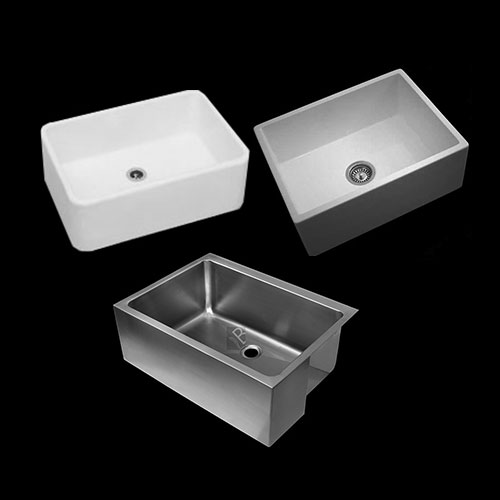I have been asked so many times what is the difference between the ceramic, engineered stone and stainless steel butler sinks, that I thought I would post it on the web.
The one is not better than the other. It really depends on your application and what you intend to use it for. For light lab work with a lot of glassware, I would recommend the engineered stone types. If you are going to use a lot of acids and industrial chemicals, use the fireclay type. A lot of restaurants use the engineered stone types since they found less breakages. Stainless steel butler sinks will last a lifetime but can look a cold in some kitchen designs.
The only sink that is maintenance free are fireclay sinks, but remember, you cannot polish it to look new again. Engineered stone butler sinks can be polished when it loses its shine and stainless steel butler sinks must be polished weekly with stainless steel polish.
Below is a table that summarizes the most important differences between the ceramic fireclay and engineered stone butler sinks.
| Aspects | Ceramic | Engineered stone | Stainless steel |
|---|---|---|---|
| Material | Fireclay ceramic which is harder than normal ceramic | Mixture of inorganic material such as rock, quartz mixed with resin to make a mould | Thick 1.2 - 1.6 mm grade 304 or 316 stainless steel |
| Colour | White only | White only (but materials do come in other colours) | Unpolished stainless steel |
| Sizes available | Currently two sizes but single bowl only (double bowls are very expensive) | Two sizes, single and double bowl | Can be customized to almost any size. Lead times will apply. |
| Hardness of material | Extremely hard. So hard it is prone to break glass ware. One of the reasons people are switching to engineered stone | Softer than fireclay so not prone to break glass ware. | Stainless steel is hard, but not that prone to breaking glassware as fireclay |
| Scratch resistant | Good scratch resistance but it will show wear over time which cannot be polished | Will scratch over time BUT, scratches can be polished out with waterproof sandpaper (1200+ grid) | Will scratch over time but small scratches are polished out with stainless steel polish which must be done at least once a week |
| Chip resistance | Fireclay ceramic can chip and you will see the underlying clay layer. Very difficult to repair. | Since engineered stone is slightly softer it is resistant to chipping. Although it can chip if the object is sharp such as the bottom edge of a pot. In the case of a chip, you don't see the clay layer. The engineered stone material is the same colour right through. The sharp edge can be buffed to look less prominent. | Will not chip but will dent. |
| Colour fastness | Will keep its colour, however, colour may change over time but that is due to small particles filling the cracks and scratches. Can be cleaned with strong detergents. | Colour fast as long as it is not placed in the sun. Resins are attaced by the sun's UV rays and can discolour. The same applies to all engineered stone materials such as Cesarstone, Prostone and Technistone. | Stainless steel will not discolour unless very harsh chemicals are used or the steel is exposed to chlorine chemicals for a couple of hours. Most stains can be removed with stainless steel polish. |
| Easy to install | Can be tricky to ensure good seal between work surface and sink since the fireclay is not 100% flat. Due to clay movement in the oven. | Engineered stone is a mould and the surface is flat so it is easy to install and create a good waterproof seal between sink and work surface | Very easy to install since it is custom made and the surface is flat. |
| Acid resistance | Yes. actually these sinks are designed to handle acids and other types of harsh chemicals in labs and hospitals. | NO. Do not use harsh chemicals, especially those that contain chlorine or acids. It will damage the resin. | To some degree. Some industrial chemicals can cause stains, but again, it can be removed to an extent with stainless steel polish. |
| Dent resistance | Will chip before it dents | It is possible to dent the material with a very hard knock, but with such power what are you doing in the kitchen! | Stainless steel, like any metal suffers from "metal fatigue", i.e. the steel can bend. However, the dents can be removed by a technician at cost. |
| Maintenance required | No, you cannot polish or scrub fireclay ceramic | Material does tend to go dull after a couple of years but you can polish it to look new again. | Weekly application of stainless steel polish will keep it new. |


